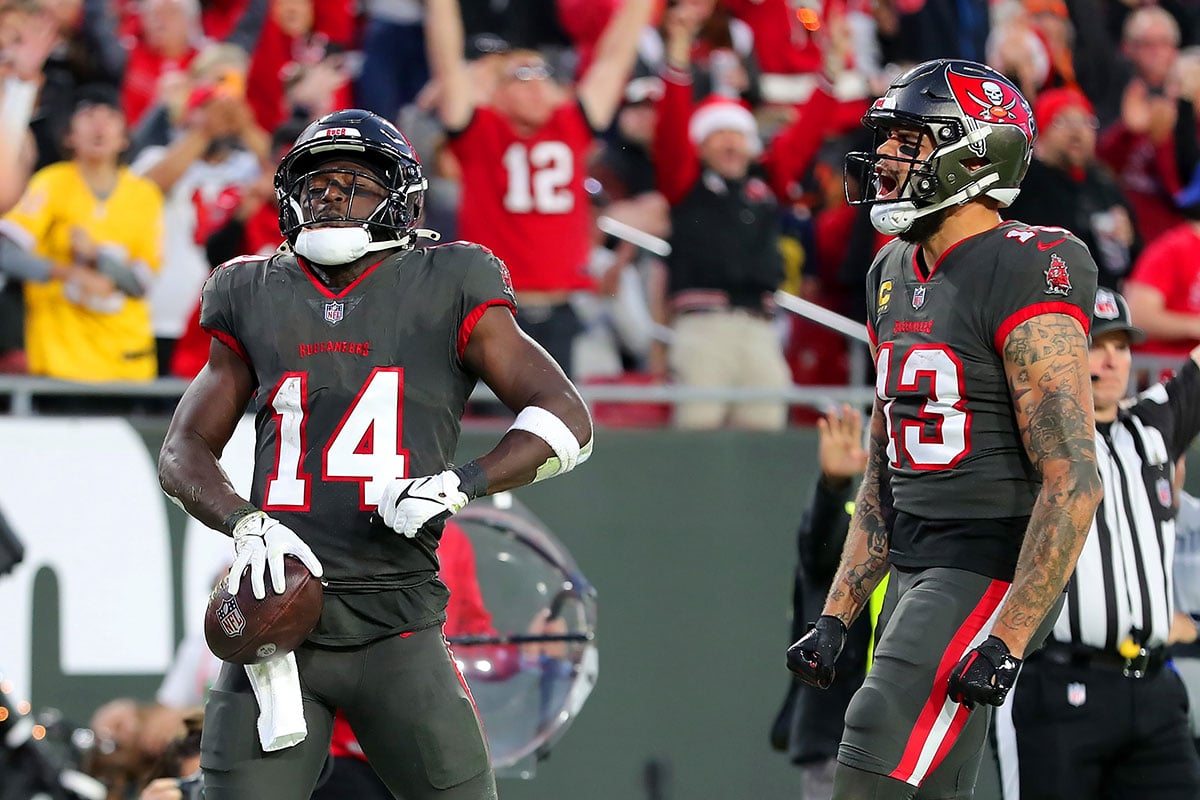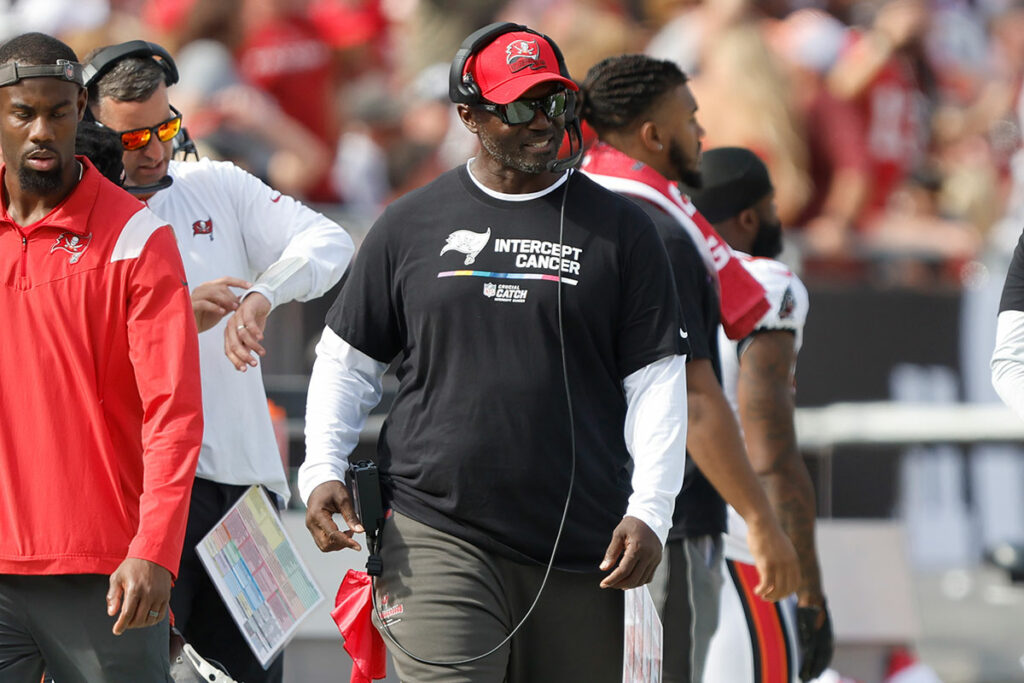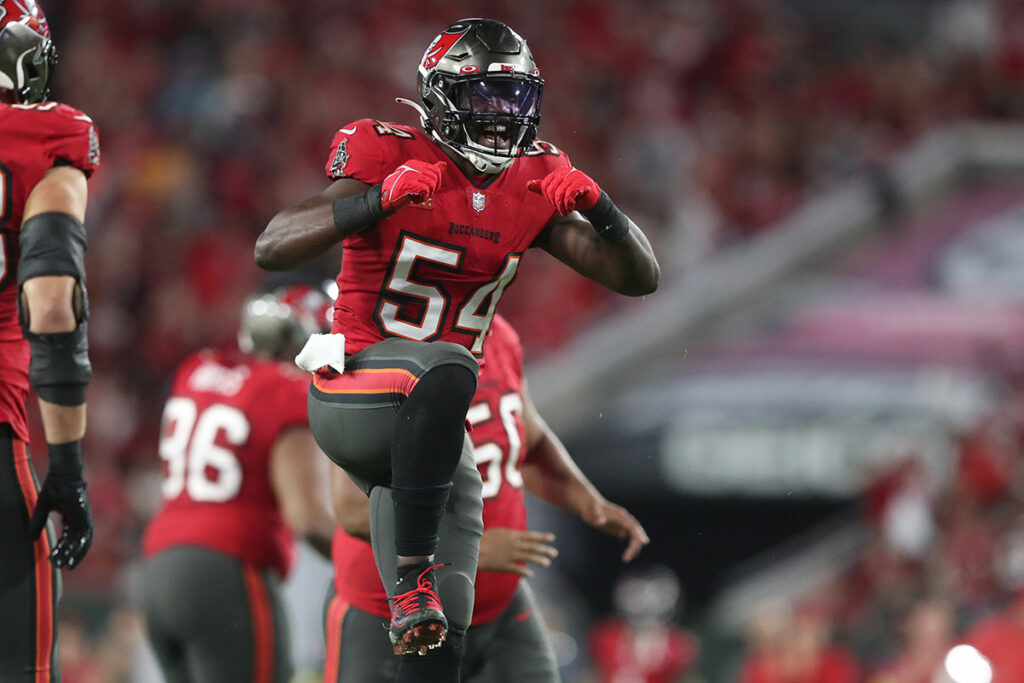Heading into 2022, the Bucs had gotten used to having an explosive, high-powered offense. In 2021, they averaged 30.1 points per game. In their Super Bowl-winning season the year before, they put up 30.8 points per game. Even in 2019, the year before Tom Brady’s arrival in Tampa, a Jameis Winston-led offense scored 28.6 per game.
Things came crashing down hard for the Tampa Bay offense in 2022. Despite still having Brady under center, the offense was inconsistent at best and stuck in neutral at worst. The Bucs posted just 18.4 points per game, and there were a lot of reasons for that dropoff. The inability of offensive coordinator Byron Leftwich to adapt was a major one, and he was fired this offseason as a result.
The other reason was a decline in talent on the offensive side of the ball. Yes, the unit still featured Brady and had Mike Evans and Chris Godwin leading the way at receiver. But Antonio Brown and Rob Gronkowski were gone, while Leonard Fournette failed to repeat the success he had during the Bucs’ Super Bowl run and throughout the 2021 season.
Russell Gage struggled with injuries and disappointed as the team’s WR3 last year, while an aging Julio Jones had little left to offer as WR4. Running back Rachaad White had a promising rookie season, as did first-year tight end Cade Otton.
Potential aside, Tampa Bay’s offensive arsenal is a long way from what it looked like a couple of years ago as the 2023 season approaches. The 2023 “offensive arsenal” rankings done by ESPN’s Bill Barnwell (ESPN+ subscription required) reflect as much.
Bucs Have Plummeted In Barnwell’s Rankings
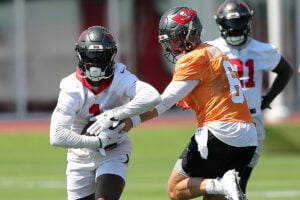
Bucs RB Rachaad White and QB Baker Mayfield – Photo by: Cliff Welch/PR
Heading into 2023, Barnwell has the Bucs’ offensive arsenal ranked as the 18th-best in the NFL. That’s down from fifth-best last year, and even that was down from the top spot in 2021. It’s hard to argue with Tampa Bay being in the middle of the pack here, too.
The Bucs’ wide receiving corps is still led by two of the league’s best, but there’s little certainty behind those two.
“Now, it’s Evans and Godwin and not much else,” Barnwell wrote. “Tampa Bay imported Russell Gage from the Falcons last year, but he averaged 8.4 yards per reception while battling various injuries, most notably a scary concussion in the playoff loss to the Cowboys. Gage missed OTAs because of another issue, and there’s little behind him on the depth chart.
“Cade Otton, forced into the starting lineup as a rookie by an injury to Brate, is the most notable of the three Day 3 selections at tight end who will take the majority of snaps at the position for Tampa Bay.”
The backfield is being led by the talented-but-unproven Rachaad White. This will be his first chance to be a full-time starter in the NFL, and there’s not much behind him in the way of established depth.
“Fournette was cut after a dismal 2022 campaign, handing the job by default to Rachaad White,” Barnwell wrote. “The 2022 third-rounder wasn’t much better as a rookie, serving mostly as a safe pair of hands in the passing game,” Barnwell wrote.
“To replace the back who produced the fewest rushing yards over expected (-135) of any player in football, the Bucs signed former Broncos back Chase Edmonds, who ranked last among players with 50 carries or more in RYOE per attempt (a whopping minus-1.6 RYOE per carry). The Bucs’ line wasn’t good without Ryan Jensen last season, but this isn’t exactly an inspiring backfield.”
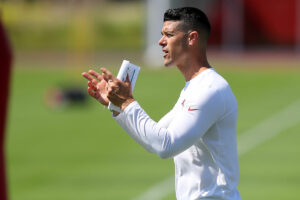
Bucs OC Dave Canales – Photo by: Cliff Welch/PR
What Barnwell writes is fair. There’s reason to be optimistic about Tampa Bay’s offense, especially with the hiring of new offensive coordinator Dave Canales to replace Leftwich. Canales will run an efficient system that is friendly to his quarterback, which should help matters. But there’s no getting around the fact that outside of Evans and Godwin, the Bucs have an arsenal of weapons that is largely full of unknowns and question marks.
Still, Evans and Godwin are much more than a lot of teams have. In fact, three playoff teams from last year are ranked below the Bucs in Barnwell’s rankings. That includes the defending Super Bowl champion Chiefs at 19th, as well as the Bills (20th) and Giants (27th).
Tampa Bay was third in the rankings as far as NFC South teams go, with the Panthers (31st) below them and the Saints (14th) and Falcons (10th) ranked ahead of them.
Bailey Adams is in his fourth year with Pewter Report. Born and raised in Tampa, he has closely followed the Bucs all his life and has covered them in some capacity since 2016. In addition to his responsibilities as a beat writer, he also contributes to the site as an editor. He graduated from the University of Central Florida in 2019 and currently co-hosts The Pegasus Podcast, a podcast dedicated to covering UCF Football.

